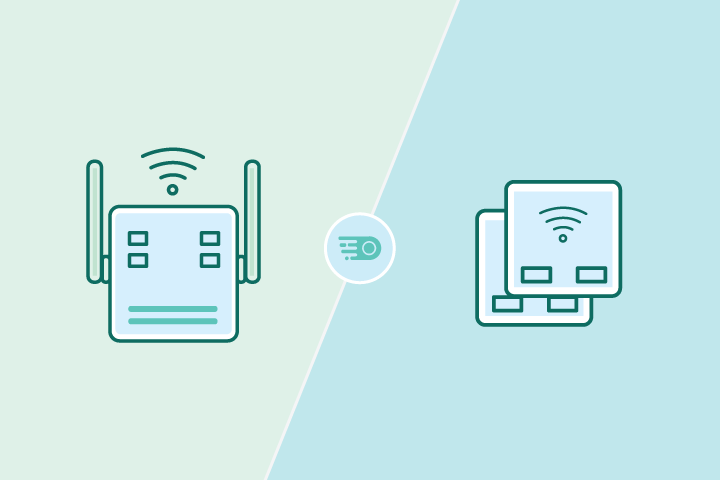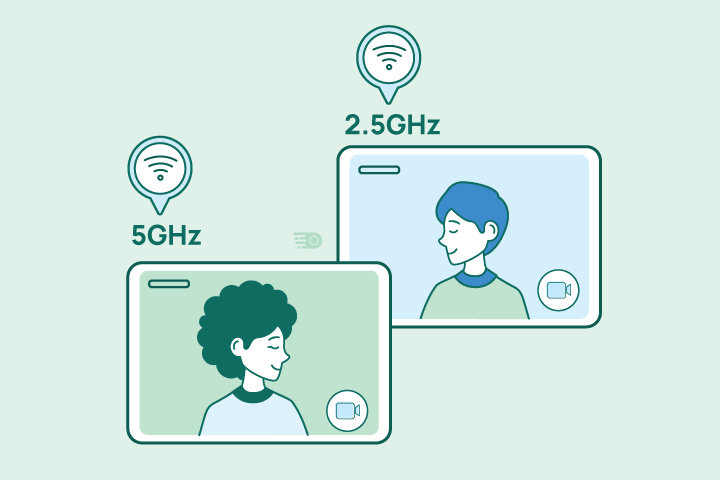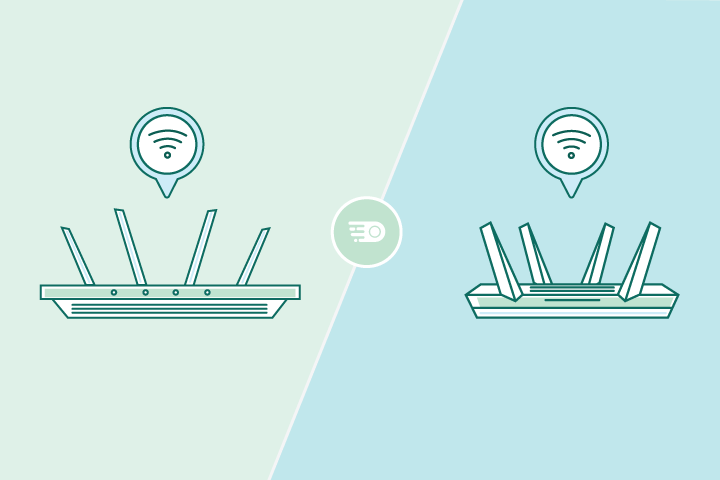WiFi Extenders vs. Mesh Wi-Fi

HighSpeedOptions prides itself on providing honest, quality content. While we may be compensated when you make a purchase through links on our site, all opinions are our own. Here's how we make money.
Table of Contents
If your internet speed is solid but your Wi-Fi is spotty in certain rooms, you’re not alone. Many homes have “dead zones” caused by distance, thick walls, appliances, or just an awkward, sprawling layout. Some routers simply aren’t made to provide whole-home Wi-Fi coverage.
Usually, investing in a solid router and placing your equipment in an optimal location helps reduce these drops in signal. When an upgraded router, moving your router, or switching bands isn’t enough, most people end up choosing one of two Wi-Fi network upgrades: a Wi-Fi extender or a mesh Wi-Fi system. This guide breaks down how each one works, what it costs, and which option fits your home best.
Key Takeaways: Wi-Fi Extenders and Mesh Wi-Fi Systems
- Choose a Wi-Fi extender if you have one problem area and want a low-cost fix that works with your current router.
- Choose mesh Wi-Fi if you have multiple dead zones, multiple floors, or you want seamless roaming throughout the house.
- Extenders can be slower than your router’s Wi-Fi connection, frequently by about 50%.
- Wi-Fi extenders vary in cost, ranging from $30–$80; higher-end Wi-Fi 6E and Wi-Fi 7 models can be $100+.
- Mesh systems are more expensive than extenders, with prices ranging from $200 to over $2000.

Comparing Wi-Fi Extenders vs Mesh Wi-Fi
| Guided app setup, more steps, but straightforward | Wi-Fi Extender | Mesh Wi-Fi |
| Best for | One dead zone, smaller homes, single room issues | Whole-home coverage, multiple floors, consistent signal |
| Typical cost | Lower upfront | Higher upfront, more hardware |
| Roaming | Can be less seamless (often separate “network” behavior) | Seamless roaming on one network name |
| Speed consistency | More variable, depends heavily on placement | More consistent across rooms when nodes are placed well |
| Scaling | Limited, adding more can compound issues | Designed to expand by adding nodes |
| Setup | Usually quick | Guided app setup, more steps but straightforward |
| Guided app setup, more steps, but straightforward | Best for |
| Wi-Fi Extender | One dead zone, smaller homes, single room issues |
| Mesh Wi-Fi | Whole-home coverage, multiple floors, consistent signal |
| Guided app setup, more steps, but straightforward | Typical cost |
| Wi-Fi Extender | Lower upfront |
| Mesh Wi-Fi | Higher upfront, more hardware |
| Guided app setup, more steps, but straightforward | Roaming |
| Wi-Fi Extender | Can be less seamless (often separate ânetworkâ behavior) |
| Mesh Wi-Fi | Seamless roaming on one network name |
| Guided app setup, more steps, but straightforward | Speed consistency |
| Wi-Fi Extender | More variable, depends heavily on placement |
| Mesh Wi-Fi | More consistent across rooms when nodes are placed well |
| Guided app setup, more steps, but straightforward | Scaling |
| Wi-Fi Extender | Limited, adding more can compound issues |
| Mesh Wi-Fi | Designed to expand by adding nodes |
| Guided app setup, more steps, but straightforward | Setup |
| Wi-Fi Extender | Usually quick |
| Mesh Wi-Fi | Guided app setup, more steps but straightforward |
Pricing and performance vary by brand, the Wi-Fi standard, and placement, but in general:
- Extenders are cheaper
- Mesh systems are smoother for whole-home coverage.
What is a Wi-Fi Extender?
A Wi-Fi extender (sometimes called a repeater or booster) is a device that connects to your router’s Wi-Fi signal and rebroadcasts it to reach farther areas of your home. Think of it as a relay station for your Wi-Fi network.
How Does a Wi-Fi Extender Work?
A Wi-Fi extender connects to your router, usually via Wi-Fi, and extends coverage in a nearby area by rebroadcasting the signal from the router. It creates its own zone with a separate SSID (network name). While it can fill a dead Wi-Fi zone in your house, you have to manually connect your devices to it.
Pros and Cons of Wi-Fi Extenders
Pros
More affordable compared to a new router or mesh network
Compatible with existing router
Great solution for small homes
Effectively eliminates Wi-Fi dead zones
Cons
Not ideal for larger homes
Performance depends on placement and distance from the router
Must manually switch networks to connect
No more than 1 extender recommended
Do Wi-Fi Extenders Slow Down Internet?
They don’t slow down your internet connection, but your Wi-Fi connection will most likely be slower because many extenders use Wi-Fi to communicate with your router and then broadcast it. That overhead can reduce throughput as much as 50% of what you get from the main router. It can be worse depending on how far it is from the router, interference, and obstacles.
This doesn’t mean Wi-Fi extenders are a bad option. It depends on what you’re trying to achieve. An extender is best when your goal is coverage, not seamless roaming and maximum speed throughout the house.
Where Should You Place a Wi-Fi Extender?
The best location for a Wi-Fi extender is a balance between creating a strong connection to your router and reaching the dead zone you’re trying to fix, which means about halfway between your router and the dead zone. But there are a few things to consider:
- Keep it out in the open as much as possible and away from sources of interference, like appliances and your electrical panel.
- Make sure the extender still receives a strong signal where you plug it in.
- Test a couple of areas and run quick internet speed tests when connected to the extender.
- You can also use a Wi-Fi analyzer app to test its signal strength. We recommend NetSpot or WiFi Analyzer.
What Do Wi-Fi Extenders Cost?
Wi-Fi extender prices start around $30 and can be as much as $100. It depends on the quality and Wi-Fi standard they use. For instance, a high-end extender that uses Wi-Fi 6 or Wi-Fi 7 can cost $100 or more.
What is Mesh Wi-Fi?
A mesh Wi-Fi system uses multiple devices, called nodes, placed around your home to create a seamless Wi-Fi network to provide full coverage in your house. Instead of one router trying to reach everywhere, the nodes work together to spread coverage more evenly as one unified Wi-Fi network.
How Mesh Wi-Fi Works
Mesh nodes can connect to your modem, thereby replacing your router, or they can connect to your Wi-Fi router. Then, you’ll place additional nodes around the house to extend and strengthen coverage.
Devices typically stay on one network name, and your system hands off your connection from node to node as you move around the house. This is why mesh often feels more seamless than a Wi-Fi extender.
Pros and Cons of Mesh Wi-Fi
Pros
Better whole-home coverage
Seamless roaming on a single network name
Easy app-based setup and management
Reliable even if one hub fails
Build to scale by adding nodes
Cons
Higher upfront cost
More setup steps than a single Wi-Fi extender
Can replace your existing router
Can be excessive for smaller homes or apartments
How Many Mesh Nodes Do You Need?
Many homes start with 2–3 nodes, but layout, square footage, and wall materials will determine how many you need for your house. If you still have weak areas after your initial setup, you can easily add another node to the mesh network.
Mesh Makes Sense for Device-Heavy Homes
From smart TVs, phones, laptops, tablets, cameras, speakers, to smart-home gear, modern homes have more connected devices than ever. Mesh systems tend to handle this kind of connected home better because coverage is more consistent across rooms and devices. Especially if you pair your mesh network with a Wi-Fi 6 router that is designed to handle many connected devices.
How Much Does Mesh Wi-Fi Cost?
Due to their advanced routing and seamless connection hand-off capabilities, mesh systems are expensive, starting around $200 for entry-level equipment. Newer Wi-Fi 7 mesh kits can be around $350 for a three-node pack, while premium systems can exceed $2,000. Your final cost will depend on your needs, the devices you choose, and the layout and size of your house.
Enter your zip code to see providers near you
Important Things to Consider Before You Upgrade
Before you decide to invest in a Wi-Fi extender or mesh network system, t it helps to diagnose the real problem. Some Wi-Fi dead zones could be related to router placement issues, interference issues, or even an internet plan that is too slow for your household.
Try These Free Fixes First
- Move the router to a more central location (and a bit higher, if possible)
- Switch bands: 2.4 GHz tends to reach farther, 5 GHz is usually faster at shorter range
- Disconnect or pause unused devices to reduce congestion
- Update router firmware
- Run an internet speed test close to the router and then from the problem room to see if it’s Wi-Fi coverage or your internet speed
Determine Your Budget
- If a single extender solves the problem, that’s the cheapest win.
- If you are about to buy multiple extenders, compare that total cost against an entry mesh kit. Mesh may be worth any extra costs for better coverage and ease of use.
Think About Layout, Not Just Square Footage
Sure, the size of your house matters, but how it’s laid out and how open it is will have the most effect on your Wi-Fi network.
- A closed floorplan with long hallways, basements, and multiple floors is ideal for a mesh system.
- One stubborn room at the edge of Wi-Fi coverage would benefit from a Wi-Fi extender.
The Benefit of Seamless Roaming
Another deciding factor between Wi-Fi extenders vs. mesh Wi-Fi is a matter of convenience. If you tend to walk around while on remote work calls, stream in different rooms, or just want your phone to stay connected without having to change the Wi-Fi network it’s connected to, then a mesh system is for you. If you use an extender, you’d have to manually change Wi-Fi networks whenever you move in or out of the extender’s range.
How to Choose Between a Wi-Fi Extender and Mesh Wi-Fi
Wi-Fi extenders and mesh systems don’t work for all situations. One might be a better choice than the other for your needs. Check these situations below out to help decide which works best for you:
Choose a Wi-Fi Extender If…
- You have one weak room or area in your house
- You want the cheapest upgrade
- You can place the extender where it still gets a strong signal from the router
- You don’t need the fastest speeds in the area with weak reception
- You don’t mind manually switching between Wi-Fi networks as you move about
Choose Mesh Wi-Fi If…
- You have multiple dead zones or multiple floors in the house
- You want seamless roaming throughout your house on one network name
- Your home has a lot of connected devices, such as smart home devices, and multiple people streaming and working
- You want a system you can expand later by adding nodes
If performance is your top priority, extenders can be fine for coverage, but they are often slower and rely on optimal placement. Mesh generally delivers more consistent performance throughout the home when nodes are placed well, and you can build your mesh network to scale.
Set Up Tips to Get the Most Out of Your Upgrade
Wi-Fi extenders benefit most when you take time to place and set them up properly. An extender will perform best when it’s placed so that it gets the strongest signal possible from your router and can broadcast it to the dead zone. When you set up your mesh system, you need to think about reaching all corners of your home as you place them.
Wi-Fi Extender Setup Tips
- Use the manufacturer’s app or pairing method so you are not guessing settings.
- Place it about halfway between the router and the dead zone, as long as it gets an ample signal from the router.
- Do not put the extender in the dead zone.
- For simplicity, avoid using more than one extender, unless you have no other option.
- Test your internet speeds after placement, then try one alternate location to compare how they perform.
Mesh Wi-Fi Setup Tips
- Start with the recommended node placement from the app, then adjust after testing coverage
- Keep nodes in open areas when possible (not hidden behind a TV or inside a cabinet)
- If your system supports it and you have wiring available, wired connections between nodes can improve stability (often called wired backhaul)
When It’s Not Your Wi-Fi: Signs You May Need Faster Internet
Although it’s the case many times, slow performance may not be caused by your Wi-Fi gear. Here are a few clues that your internet provider could be the bottleneck:
- Speeds are slow, even when you are close to your router
- Multiple people streaming, gaming online, and working at the same time causes constant buffering
- Video calls drop even when your Wi-Fi signal looks strong
If that sounds familiar, it can help to run a speed test and compare your results to what your household actually needs. Then, if necessary, check what faster plans are available in your area.
Choosing the Right Wi-Fi Upgrade for Your Home
If you only need to fix one weak spot, a Wi-Fi extender is the fastest and cheapest way increase the range of your Wi-Fi network. If you want stronger Wi-Fi throughout your house, seamless roaming, and a setup that can grow with your household, mesh is usually the better choice for long-term use.
Either way, a quick internet speed test and a little planning and placement testing will improve dead zones and limited Wi-Fi signal range. If your internet connection is still underwhelming even near the router, it might be time to look for faster internet options where you live.
Frequently Asked Questions About Wi-Fi Extenders and Mesh Wi-Fi
You don’t have to use a router, but you can if you want to. Most mesh systems replace the routing function, but you will need a modem or a gateway to access the connection from your internet provider.
They can. Wi-Fi extenders connect to your router’s Wi-Fi signal and then rebroadcast it, which can decrease speed and increase internet latency, sometimes by 50%. Plus, Wi-Fi extenders are susceptible to interference and materials in your home that can block Wi-Fi signals.
Put it where it still gets a strong signal from the router, often about halfway between it and the dead zone. Then test its performance from the dead zone area.
People often use the terms interchangeably. In general, both are designed to extend coverage, but features and performance vary by model and Wi-Fi standard.
You can, but we don’t recommend it because you’d be adding another SSID (network name) for each additional extender you add. If you need more than one, you probably ought to consider a mesh system instead.
Mesh systems are quite a bit more expensive: extenders often start around $30 and mesh systems start around $200. However, mesh prices go up, sometimes as high as $2000 for a premium set up, depending on your needs and the size and layout of your house.
Find providers in your area

Table of Contents





